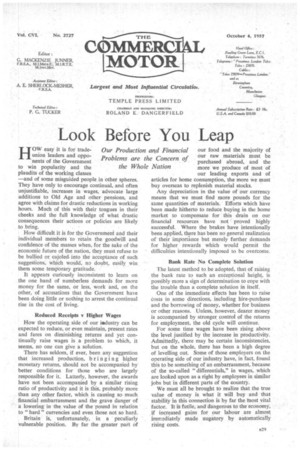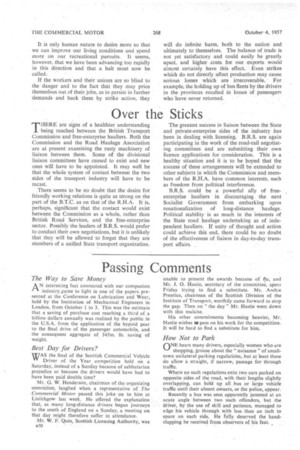Look Before You Leap
Page 35

Page 36

If you've noticed an error in this article please click here to report it so we can fix it.
Our Production and Financial Problems are the Concern of the Whole Nation
HOW easy it is for tradeunion leaders and oppo nents of the Government to win popularity and the plaudits of the working classes —and of some misguided people in other spheres. They have only to encourage continual, and often unjustifiable, increases in wages, advocate large additions to Old Age and other pensions, and agree with claims for drastic reductions in working hours. Much of this with their tongues in their cheeks and the full knowledge of what drastic consequences their actions or policies are likely to bring.
How difficult it is for the Governvneni and their individual members to retain the goodwill and confidence of the masses when, for the sake of the economic future of the nation, they must refuse to be bullied or cajolect into the acceptance of such suggestions, which would, no doubt, easily win them some temporary gratitude.
It appears curiously inconsistent to learn on the one hand of numberless demands for more money for the same, or less, work and, on the other, of accusations that the Government have been doing little or nothing to arrest the continual rise in the cost of living.
Reduced Receipts v Higher Wages How the operating side of our iodustry can be expected to reduce, or even maintain, present rates and fares on diminishing returns and yet continually raise wages is a problem to which, it seems, no one can give a solution.
There has seldom, if ever, been any suggestion that increased production, bringing higher monetary returns, should not be accompanied by better conditions for those who are largely responsible for it. Latterly, however, the awards have not been accompanied by a similar rising ratio of productivity and it is this, probably more than any other factor, which is causing so much financial embarrassment and the grave danger of a lowering in the value of the pound in relation to " hard " currencies and even those not so hard.
Britain is, unfortunately, in a peculiarly vulnerable position. By far the greater part of our food and the majority of our raw materials must be purchased abroad, and the more we produce of most of our leading exports and of articles for home consumption, the more we must buy overseas to replenish material stocks.
Any depreciation in the value of our currency means that we must find more pounds for the same quantities of materials. Efforts which have been made hitherto to reduce buying in the home market to compensate for this drain on our financial resources have not proved highly successful. Where the brakes have intentionally been applied, there has been no general realization of their importance but merely further demands for higher rewards which would permit the difficulties intentionally imposed to be overcome.
Bank Rate No Complete Solution The latest method to be adopted, that of raising the bank rate to such an exceptional height, is possibly more a sign of determination to cope with the trouble than a complete solution in itself.
One of the immediate effects has been to raise aosts in some directions, including hire-purchase and the borrowing of money, whether for business or other reasons. Unless, however, dearer money is accompanied by stronger control of the returns for employment, the old cycle will continue.
For some time wages have been rising above the level justified by the increase in productivity. Admittedly, there may be certain inconsistencies, but on the whole, there has been a high degree of levelling out. Some of those employers on the operating side of our industry have, in fact, found this to be something of an embarrassment, because of the so-called "differentials." in wages, which are looked upon as a right by employees in similar jobs but in different parts of the country.
We must all be brought to realize that the true value of money is what it will buy and that stability in this connection is by far the Most vital factor. It is futile, and dangerous to the economy, if increased gains for our labour are almost immediately made nugatory by automatically rising costs. It is only human nature to desire more so that we can improve our living conditions and spend more on our recreational pursuits. It seems, however, that we have been advancing too rapidly in this direction and that a halt must now be called..
lithe workers and their unions are so blind to the danger and to the fact that they may price themselves out of their jobs, as to persist in further demands and back them by strike action, they will do infinite harm, both to the nation and ultimately to themselves. The balance of trade is not yet satisfactory and could easily be greatly upset, and higher costs for our, exports would almost certainly have this effect. Even strikes which do not directly affect production may cause serious losses which are irrecoverable. For example, the holding up of bus fleets by the drivers in the provinces resulted in losses of passengers who have neve,r returned.




















































































































